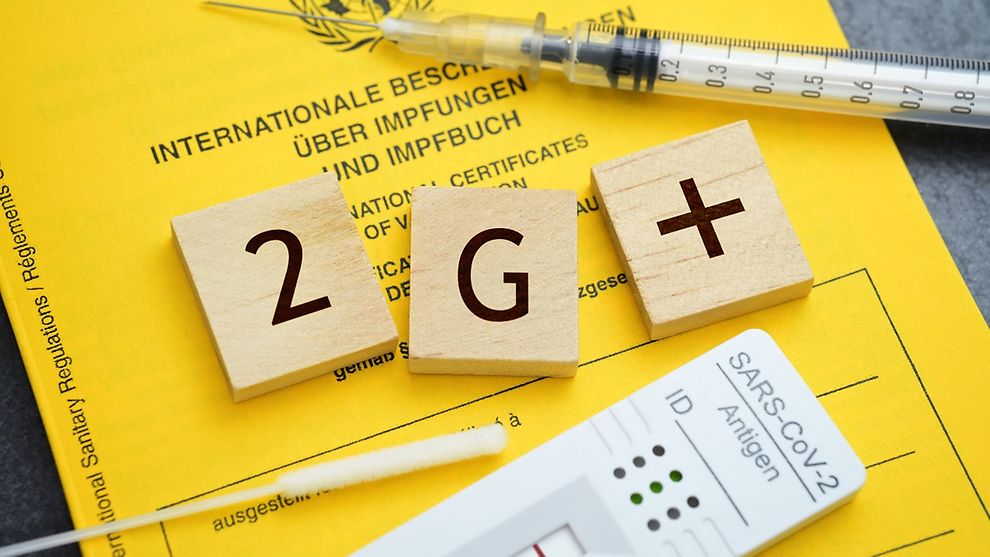Please note that only the German version of the regulations published in the Hamburg Law and Ordinance Gazette (available on the Internet at www.luewu.de) is legally binding. For more information, please see the rules and regulations for the containment of the COVID-19 pandemic. For more English information, please see our English FAQs and the official German regulations.
What do '3G', '2G' and '2G+' mean?
3G
'3G' is short for Geimpfte, Genesene and Getestete (lit. 'vaccinated persons', 'recovered persons' and 'tested persons'). Public areas or services that implement the 3G access plan are required to service only persons who are fully vaccinated, fully recovered or have tested negative for COVID-19.
This means that persons who are not sufficiently protected against COVID-19 by means of vaccination or antibodies from a previous infection are granted access if they carry a valid negative test result. The result of this test (either PCR or antigen test) must be issued by an approved service provider, for example a test centre.
2G
‘2G’ stands for Geimpfte and Genesene only. This means that facilities for which this access plan applies only service those who are fully vaccinated against or fully recovered from a previous infection with COVID-19.
Additional testing is not required to be granted access to 2G facilities. But persons who are neither fully vaccinated nor recovered, but only have a negative test result are not permitted entry to or participation in 2G facilities or activities.
2G+
‘2G+’ means that in order for customers, clients or visitors to enter facilities for which 2G+ applies, they must be either fully vaccinated or fully recovered, and submit an additional negative test result.
Exceptions: For the 2G+ access plan, persons who have already received their third jab (booster) do not have to submit a test result.
| Note: As of now, three vaccinations total are required for someone to be considered fully vaccinated; this is true regardless of which vaccine (or vaccines) the vaccination roster consisted of. This means that also for persons whose first vaccination was the single-dose Johnson&Johnson vaccine, they only count as fully vaccinated after an additional two jabs. Persons who have recovered from an infection with COVID-19 after their second or third jab are also exempt from the testing requirement. |
As it is assumed that children under the age of 16 are tested regularly at school, the restrictions of the 2G+ plan do not apply to them. Still, as children ages 12 and over can now get vaccinated safely, it is recommended that they do so as soon as possible. Also, children ages 5 and over who have pre-existing medical conditions can already get vaccinated against COVID-19.
What does this mean for customers?
In order to be granted access, customers, clients or visitors must be ready to present their Impfnachweis (proof of vaccination), whether in paper or electronic form, their Genesenennachweis (proof of full recovery), and/or negative test result (either PCR or antigen, and issued by approved service providers) on request, as well as proof of their identity.
As an additional safety measure, face masks are mandatory in all indoor areas, even if the 2G+ plan applies. Some exceptions apply, for example while seated at a table in a restaurant, or while exercising or playing sports. Members of staff in any such area who are not vaccinated must test negative for COVID-19 on a daily basis.
What are the advantages?
For businesses, locations and service providers that implement either 2G or 2G+, many other restrictions may be lifted. For example, theatres and cinemas that run the 2G+ access plan may operate at full capacity if all guests wear medical face masks. 2G restaurants and bars may allow more patrons into their indoor areas and contact restrictions may be loosened to certain extent.
This is because the 2G+ plan is much safer than 3G, since testing alone does not guarantee the same level of protection against COVID-19 as a full vaccination (or recovery) in combination with testing does.
Hamburg residents who have not yet received their vaccination or booster jabs still have the chance to do so at their doctor’s office, at the official vaccination points in every district, and from mobile vaccination teams.
What are the time frames for certificates?
Vaccination/recovery certificates
- Initial vaccination certificates are valid starting 14 days after the second vaccination jab. However, as mentioned above, a total of three jabs, including a booster vaccination, are now required for persons to be considered fully vaccinated.
- Booster vaccinations are valid from the day of the injection.
- Certificates of recovery from an infection with COVID-19 are valid from 28 days after the first positive test result until no more than 90 days after the first positive test result.
Test certificates
- Antigen rapid test certificates are valid for 24 hours after the result is issued.
- PCR test certificates are valid for 48 hours after the test result is issued.
Note: The time frames between each vaccination depend on the individual vaccines. As a general rule, the first and second vaccination should be 4 to 6 weeks apart. The booster vaccination should succeed 3 months after the second vaccination. For more information, please consult your physician/GP.
What applies where?
The rules regarding which access plan applies where are subject to change. For the most recent updates, please check back on our overview page.
None of the access plans apply in these areas
Neither the 3G, 2G nor 2G+ access plans are applicable to businesses and shops providing services and selling products for everyday needs. This means that businesses such as wholesale, grocery and beverage shops, pharmacies, medical supply shops, specialist shops selling products for babies, petrol/gas stations, banks, post offices, newsagents, dry cleaners and laundrettes, pet supplies shops and vehicle and bicycle repair shops remain open to the general public, but all customers must wear medical face masks.

